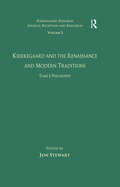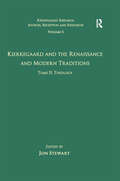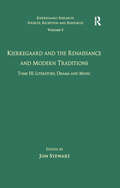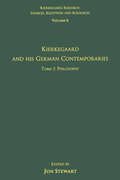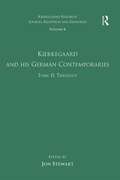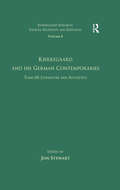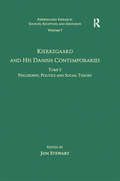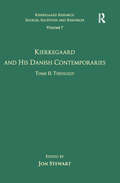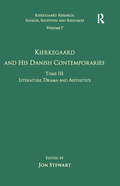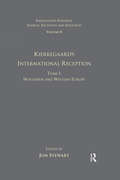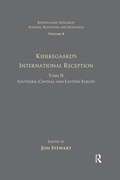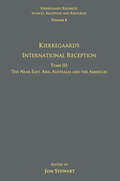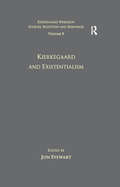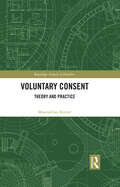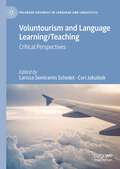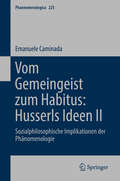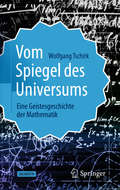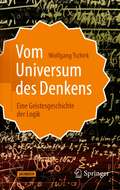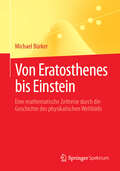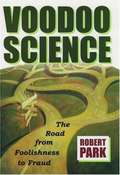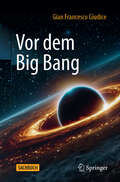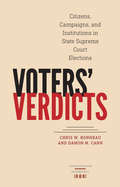- Table View
- List View
Volume 5, Tome I: Kierkegaard and the Renaissance and Modern Traditions - Philosophy (Kierkegaard Research: Sources, Reception and Resources)
by Jon StewartThe long period from the Renaissance to the nineteenth century supplied numerous sources for Kierkegaard's thought in any number of different fields. The present, rather heterogeneous volume covers the long period from the birth of Savonarola in 1452 through the beginning of the nineteenth century and into Kierkegaard's own time. The Danish thinker read authors representing vastly different traditions and time periods. Moreover, he also read a diverse range of genres. His interests concerned not just philosophy, theology and literature but also drama and music. The present volume consists of three tomes that are intended to cover Kierkegaard's sources in these different fields of thought. Tome I is dedicated to the philosophers of the early modern period and the Enlightenment who played a role in shaping Kierkegaard's intellectual development. He was widely read in German and French philosophy of the sixteenth, seventeenth and eighteenth centuries, making reference to the leading rationalist philosophers Descartes, Spinoza and Leibniz in his journals and published works. Further, connections have also been pointed out between his thought and the writings of the French thinkers Montaigne, Pascal and Rousseau, who share with Kierkegaard a form of philosophy that is more interested in life and existence than purely conceptual analysis. Through the works of the authors explored here Kierkegaard became acquainted with some of the major philosophical discussions of the modern era such as the beginning of philosophy, the role of doubt, the status of autonomy in ethics and religion, human freedom, the problem of the theodicy found in thinkers such as Bayle and Leibniz, and the problem of the relation of philosophy to religion as it appears in the German writers Jacobi and Lessing.
Volume 5, Tome II: Kierkegaard and the Renaissance and Modern Traditions - Theology (Kierkegaard Research: Sources, Reception and Resources)
by Jon StewartThe long period from the Renaissance to the nineteenth century supplied numerous sources for Kierkegaard's thought in any number of different fields. The present, rather heterogeneous volume covers the long period from the birth of Savonarola in 1452 through the beginning of the nineteenth century and into Kierkegaard's own time. The Danish thinker read authors representing vastly different traditions and time periods. Moreover, he also read a diverse range of genres. His interests concerned not just philosophy, theology and literature but also drama and music. The present volume consists of three tomes that are intended to cover Kierkegaard's sources in these different fields of thought. Tome II is dedicated to the wealth of theological and religious sources from the beginning of the Reformation to Kierkegaard's own day. It examines Kierkegaard's relations to some of the key figures of the Reformation period, from the Lutheran, Reformed and Catholic traditions. It thus explores Kierkegaard's reception of theologians and spiritual authors of various denominations, most of whom are known to history primarily for their exposition of practical spirituality rather than theological doctrine. Several of the figures investigated here are connected to the Protestant tradition of Pietism that Kierkegaard was familiar with from a very early stage. The main figures in this context include the "forefather" of Pietism Johann Arndt, the Reformed writer Gerhard Tersteegen, and the Danish author Hans Adolph Brorson. With regard to Catholicism, Kierkegaard was familiar with several popular figures of Catholic humanism, Post-Tridentine theology and Baroque spirituality, such as François Fénelon, Ludwig Blosius and Abraham a Sancta Clara. He was also able to find inspiration in highly controversial and original figures of the Renaissance and the early Modern period, such as Girolamo Savonarola or Jacob Böhme, the latter of whom was at the time an en vogue topic among trendsetting philosophers and theologians such as Hegel, Franz von Baader, Schelling and Hans Lassen Martensen.
Volume 5, Tome III: Kierkegaard and the Renaissance and Modern Traditions - Literature, Drama and Music (Kierkegaard Research: Sources, Reception and Resources)
by Jon StewartThe long period from the Renaissance to the nineteenth century supplied numerous sources for Kierkegaard's thought in any number of different fields. The present, rather heterogeneous volume covers the long period from the birth of Savonarola in 1452 through the beginning of the nineteenth century and into Kierkegaard's own time. The Danish thinker read authors representing vastly different traditions and time periods. Moreover, he also read a diverse range of genres. His interests concerned not just philosophy, theology and literature but also drama and music. The present volume consists of three tomes that are intended to cover Kierkegaard's sources in these different fields of thought. Tome III covers the sources that are relevant for literature, drama and music. Kierkegaard was well read in the European literature of the seventeenth and eighteenth century. He was captivated by the figure of Cervantes' Don Quixote, who is used as a model for humor and irony. He also enjoyed French literature, represented here by articles on Chateaubriand, Lamartine, and Mérimée. French dramatists were popular on the Danish stage, and Kierkegaard demonstrated an interest in, among others, Moliére and Scribe. Although he never possessed strong English skills, this did not prevent him from familiarizing himself with English literature, primarily with the help of German translations. While there is an established body of secondary material on Kierkegaard's relation to Shakespeare, little has been said about his use of the Irish dramatist Sheridan. It is obvious from, among other things, The Concept of Irony that Kierkegaard knew in detail the works of some of the main writers of the German Romantic movement. However, his use of the leading figures of the British Romantic movement, Byron and Shelley, remains largely unexplored terrain. The classic Danish authors of the eighteenth century, Holberg, Wessel and Ewald, were influential figures who prepared the way for the Golden Age of Danish poetry. Kierkegaard constantly refers to their dramatic characters, whom he often employs to illustrate a philosophical idea with a pregnant example or turn of phrase. Finally, while Kierkegaard is not an obvious name in musicology, his analysis of Mozart's Don Giovanni shows that he had a keen interest in music on many different levels.
Volume 6, Tome I: Kierkegaard and His German Contemporaries - Philosophy (Kierkegaard Research: Sources, Reception and Resources)
by Jon StewartThis volume explores in detail Kierkegaard's various relations to his German contemporaries. Kierkegaard read German fluently and made extensive use of the writings of German-speaking authors. Apart from his contemporary Danish sources, the German sources were probably the most important in the development of his thought generally. This volume represents source-work research dedicated to tracing Kierkegaard's readings and use of the various German-speaking authors in the different fields in a way that is as clearly documented as possible. The volume has been divided into three tomes reflecting Kierkegaard's main areas of interest with regard to the German-speaking sources, namely, philosophy, theology and a more loosely conceived category, which has here been designated "literature and aesthetics." This first tome treats the German philosophical influences on Kierkegaard. The dependence of Danish philosophy on German philosophy is beyond question. In a book review in his Hegelian journal Perseus, the poet, playwright and critic, Johan Ludvig Heiberg laments the sad state of philosophy in Denmark, while lauding German speculative philosophy. Moreover, Kierkegaard's lifelong enemy, the theologian Hans Lassen Martensen claims without exaggeration that the Danish systems of philosophy can be regarded as the "disjecta membra" of earlier German systems. All of the major German idealist philosophers made an impact in Denmark: Kant, Fichte, Schelling, and most significantly, Hegel. Kierkegaard was widely read in the German philosophical literature, which he made use of in countless ways throughout his authorship.
Volume 6, Tome II: Kierkegaard and His German Contemporaries - Theology (Kierkegaard Research: Sources, Reception and Resources)
by Jon StewartThis volume explores in detail Kierkegaard's various relations to his German contemporaries. Kierkegaard read German fluently and made extensive use of the writings of German-speaking authors. Apart from his contemporary Danish sources, the German sources were probably the most important in the development of his thought generally. This volume represents source-work research dedicated to tracing Kierkegaard's readings and use of the various German-speaking authors in the different fields in a way that is as clearly documented as possible. The volume has been divided into three tomes reflecting Kierkegaard's main areas of interest with regard to the German-speaking sources, namely, philosophy, theology and a more loosely conceived category, which has here been designated "literature and aesthetics." This second tome of the present volume is dedicated to Kierkegaard's main theological influences. In theology the German and the Danish traditions had long been closely connected via their common source: Luther. In Kierkegaard's time the main influence on theology was probably German philosophy and specifically Hegelianism. Most of the German theologians were in some way in a critical dialogue with this movement. Another important influence was Schleiermacher, who visited Copenhagen in 1833 and was important for several Golden Age thinkers. From his student days Kierkegaard kept abreast of the German theological literature, from which he drew much inspiration.
Volume 6, Tome III: Kierkegaard and His German Contemporaries - Literature and Aesthetics (Kierkegaard Research: Sources, Reception and Resources)
by Jon StewartThis volume explores in detail Kierkegaard's various relations to his German contemporaries. Kierkegaard read German fluently and made extensive use of the writings of German-speaking authors. It can certainly be argued that, apart from his contemporary Danish sources, the German sources were probably the most important in the development of his thought generally. The volume has been divided into three tomes reflecting Kierkegaard's main areas of interest with regard to the German-speaking sources, namely, philosophy, theology and a more loosely conceived category, which has here been designated "literature and aesthetics." This third tome is dedicated to the German literary sources that were significant for Kierkegaard; in particular the work of authors from German Classicism and Romanticism. Important forerunners for many of Kierkegaard's literary motifs and characters can be found in the German literature of the day. His use of pseudonyms and his interest in irony were both profoundly influenced by German Romanticism. This volume demonstrates the extent to which Kierkegaard's views of criticism and aesthetics were decisively shaped by the work of German authors.
Volume 7, Tome I: Kierkegaard and his Danish Contemporaries - Philosophy, Politics and Social Theory (Kierkegaard Research: Sources, Reception and Resources #Vol. 7)
by Jon StewartThe period of Kierkegaard's life corresponds to Denmark's "Golden Age," which is conventionally used to refer to the period covering roughly the first half of the nineteenth century, when Denmark's most important writers, philosophers, theologians, poets, actors and artists flourished. Kierkegaard was often in dialogue with his fellow Danes on key issues of the day. His authorship would be unthinkable without reference to the Danish State Church, the Royal Theater, the University of Copenhagen or the various Danish newspapers and journals, such as The Corsair, Fædrelandet, and Kjøbenhavns flyvende Post, which played an undeniable role in shaping his development. The present volume features articles that employ source-work research in order to explore the individual Danish sources of Kierkegaard's thought. The volume is divided into three tomes in order to cover the different fields of influence. Tome I is dedicated to exploring the sources that fall under the rubrics, "Philosophy, Politics and Social Theory." With regard to philosophy, Kierkegaard read the works of all the foremost Danish thinkers of the time and their German antecedents, in particular Kant, Schilling and Hegel. While he was sympathetic to individual ideas offered by this tradition, he was generally keen to criticize the German model of philosophy and to propose a new paradigm for philosophical thought that was more in tune with lived existence. Kierkegaard also experienced the dynamic period in history that saw the great upheavals throughout Europe in connection with the revolutions of 1848 and the First Schleswig War. While it has long been claimed that Kierkegaard was not interested in politics, recent research supports a quite different picture. To be sure, he cannot be regarded as a political scientist or social theorist in a traditional sense, but he was nonetheless engaged in the issues of his day, and in his works one can certainly find material that can be insightful for the fields of politics and social theory.
Volume 7, Tome II: Kierkegaard and His Danish Contemporaries - Theology (Kierkegaard Research: Sources, Reception and Resources #Vol. 7)
by Jon StewartThe period of Kierkegaard's life corresponds to Denmark's "Golden Age," which is conventionally used to refer to the period covering roughly the first half of the nineteenth century, when Denmark's most important writers, philosophers, theologians, poets, actors and artists flourished. Kierkegaard was often in dialogue with his fellow Danes on key issues of the day. His authorship would be unthinkable without reference to the Danish State Church, the Royal Theater, the University of Copenhagen or the various Danish newspapers and journals, such as The Corsair, Fædrelandet, and Kjøbenhavns flyvende Post, which played an undeniable role in shaping his development. The present volume features articles that employ source-work research in order to explore the individual Danish sources of Kierkegaard's thought. The volume is divided into three tomes in order to cover the different fields of influence. Tome II is dedicated to the host of Danish theologians who played a greater or lesser role in shaping Kierkegaard's thought. In his day there were a number of competing theological trends both within the church and at the Faculty of Theology at the University of Copenhagen, and not least of all in the blossoming free church movements. These included rationalism, Grundtvigianism and Hegelianism. In this quite dynamic period in Danish ecclesial history, Kierkegaard was also exercised by a number of leading personalities in the church as they attempted to come to terms with key issues such as baptism, civil marriage, the revision of the traditional psalm book, and the relation of church and state.
Volume 7, Tome III: Kierkegaard and His Danish Contemporaries - Literature, Drama and Aesthetics (Kierkegaard Research: Sources, Reception and Resources #Vol. 7)
by Jon StewartThe period of Kierkegaard's life corresponds to Denmark's "Golden Age," which is conventionally used to refer to the period covering roughly the first half of the nineteenth century, when Denmark's most important writers, philosophers, theologians, poets, actors and artists flourished. Kierkegaard was often in dialogue with his fellow Danes on key issues of the day. His authorship would be unthinkable without reference to the Danish State Church, the Royal Theater, the University of Copenhagen or the various Danish newspapers and journals, such as The Corsair, Fædrelandet, and Kjøbenhavns flyvende Post, which played an undeniable role in shaping his development. The present volume features articles that employ source-work research in order to explore the individual Danish sources of Kierkegaard's thought. The volume is divided into three tomes in order to cover the different fields of influence. Tome III is dedicated to the diverse Danish sources that fall under the rubrics "Literature, Drama and Aesthetics." The Golden Age is known as the period when Danish prose first established itself in genres such as the novel; moreover, it was also an age when some of Denmark's most celebrated national poets flourished. Accordingly, this tome contains articles on Kierkegaard's use of the great Danish poets and prose writers, whose works are frequently quoted and alluded to throughout his writings. Kierkegaard regularly attended dramatic performances at Copenhagen's Royal Theater, which was one of Europe's leading playhouses at the time. In this tome his appreciation for the art of Denmark's best-known actors and actresses is traced. Finally, this tome features articles on the leading literary critics and aesthetic theorists of the Golden Age, who served as foils for Kierkegaard's own ideas.
Volume 8, Tome I: Kierkegaard's International Reception - Northern and Western Europe (Kierkegaard Research: Sources, Reception and Resources)
by Jon StewartAlthough Kierkegaard's reception was initially more or less limited to Scandinavia, it has for a long time now been a highly international affair. As his writings were translated into different languages his reputation spread, and he became read more and more by people increasingly distant from his native Denmark. While in Scandinavia, the attack on the Church in the last years of his life became something of a cause célèbre, later, many different aspects of his work became the object of serious scholarly investigation well beyond the original northern borders. As his reputation grew, he was co-opted by a number of different philosophical and religious movements in different contexts throughout the world. The three tomes of this volume attempt to record the history of this reception according to national and linguistic categories. Tome I covers the reception of Kierkegaard in Northern and Western Europe. The articles on Denmark, Norway, Sweden, Finland and Iceland can be said to trace Kierkegaard's influence in its more or less native Nordic Protestant context. Since the authors in these countries (with the exception of Finland) were not dependent on translations or other intermediaries, this represents the earliest tradition of Kierkegaard reception. The early German translations of his works opened the door for the next phase of the reception which expanded beyond the borders of the Nordic countries. The articles in the section on Western Europe trace his influence in Great Britain, the Netherlands and Flanders, Germany and Austria, and France. All of these countries and linguistic groups have their own extensive tradition of Kierkegaard reception.
Volume 8, Tome II: Kierkegaard's International Reception - Southern, Central and Eastern Europe (Kierkegaard Research: Sources, Reception and Resources #Vol. 8)
by Jon StewartAlthough Kierkegaard's reception was initially more or less limited to Scandinavia, it has for a long time now been a highly international affair. As his writings were translated into different languages his reputation spread, and he became read more and more by people increasingly distant from his native Denmark. While in Scandinavia, the attack on the Church in the last years of his life became something of a cause célèbre, later, many different aspects of his work became the object of serious scholarly investigation well beyond the original northern borders. As his reputation grew, he was co-opted by a number of different philosophical and religious movements in different contexts throughout the world. The three tomes of this volume attempt to record the history of this reception according to national and linguistic categories. Tome II covers the reception of Kierkegaard in Southern, Central and Eastern Europe. The first set of articles, under the rubric 'Southern Europe', covers Portugal, Spain and Italy. A number of common features were shared in these countries' reception of Kierkegaard, including a Catholic cultural context and a debt to the French reception. The next rubric covers the rather heterogeneous group of countries designated here as 'Central Europe': Hungary, the Czech Republic, Slovakia and Poland. These countries are loosely bound in a cultural sense by their former affiliation with the Habsburg Empire and in a religious sense by their shared Catholicism. Finally, the Orthodox countries of 'Eastern Europe' are represented with articles on Russia, Bulgaria, Serbia and Montenegro, Macedonia and Romania.
Volume 8, Tome III: Kierkegaard's International Reception – The Near East, Asia, Australia and the Americas (Kierkegaard Research: Sources, Reception and Resources #Vol. 8)
by Jon StewartAlthough Kierkegaard's reception was initially more or less limited to Scandinavia, it has for a long time now been a highly international affair. As his writings were translated into different languages his reputation spread, and he became read more and more by people increasingly distant from his native Denmark. While in Scandinavia, the attack on the Church in the last years of his life became something of a cause célèbre, later, many different aspects of his work became the object of serious scholarly investigation well beyond the original northern borders. As his reputation grew, he was co-opted by a number of different philosophical and religious movements in different contexts throughout the world. The three tomes of this volume attempt to record the history of this reception according to national and linguistic categories. Tome III is the most geographically diverse, covering the Near East, Asia, Australia and the Americas. The section on the Near East features pioneering articles on the Kierkegaard reception in Israel, Turkey, Iran and the Arab world. The next section dubbed 'Asia and Australia' features articles on the long and rich traditions of Kierkegaard research in Japan and Korea along with the more recent ones in China and Australia. A final section is dedicated to Americas with articles on Canada, the United States, hispanophone South America, Mexico and Brazil.
Volume 9: Kierkegaard and Existentialism (Kierkegaard Research: Sources, Reception and Resources)
by Jon StewartThere can be no doubt that most of the thinkers who are usually associated with the existentialist tradition, whatever their actual doctrines, were in one way or another influenced by the writings of Kierkegaard. This influence is so great that it can be fairly stated that the existentialist movement was largely responsible for the major advance in Kierkegaard's international reception that took place in the twentieth century. In Kierkegaard's writings one can find a rich array of concepts such as anxiety, despair, freedom, sin, the crowd, and sickness that all came to be standard motifs in existentialist literature. Sartre played an important role in canonizing Kierkegaard as one of the forerunners of existentialism. However, recent scholarship has been attentive to his ideological use of Kierkegaard. Indeed, Sartre seemed to be exploiting Kierkegaard for his own purposes and suspicions of misrepresentation and distortions have led recent commentators to go back and reexamine the complex relation between Kierkegaard and the existentialist thinkers. The articles in the present volume feature figures from the French, German, Spanish and Russian traditions of existentialism. They examine the rich and varied use of Kierkegaard by these later thinkers, and, most importantly, they critically analyze his purported role in this famous intellectual movement.
Voluntary Consent: Theory and Practice (Routledge Annals of Bioethics)
by Maximilian KienerVoluntariness is a necessary condition of valid consent. But determining whether a person consented voluntarily can be difficult, especially when people are subjected to coercion or manipulation, placed in a situation with no acceptable alternative other than to consent to something, or find themselves in an abusive relationship. This book presents a novel view on the voluntariness of consent, especially medical consent, which the author calls Interpersonal Consenter-Consentee Justification (ICCJ). According to this view, consent is voluntary if and only if the process by which it has been obtained aligns with specific principles of interpersonal justification. ICCJ is distinctive because it explains voluntary consent neither as a ‘psychological’ concept indicative of the inner states of a person’s mind (e.g. willingness or reluctance) nor as a ‘circumstantial’ concept indicative of a person’s set of options. Rather, ICCJ explains the voluntariness of consent as an ‘interpersonal’ concept requiring the absence of illegitimate control within the interaction between the person giving consent and the person receiving it. In so doing, ICCJ further develops the notion of interpersonal justification, known from contractualist theories in moral philosophy, and introduces it to the debate on consent. The author employs a top-down approach, defending ICCJ’s key characteristics on the basis of general theoretical arguments, as well as a bottom-up approach, supporting ICCJ in its application to clinical challenges such as nudging and manipulation, living organ donation, and clinical trials. Voluntary Consent will appeal to researchers and advanced students in normative ethics, bioethics, philosophy of law, behavioural psychology, and medicine.
Voluntourism and Language Learning/Teaching: Critical Perspectives (Palgrave Advances in Language and Linguistics)
by Larissa Semiramis Schedel Cori JakubiakThis edited volume extends current voluntourism theorizing by critically examining the intersections among various forms of work-leisure travel and language learning/teaching. The book’s contributors investigate volunteer tourism and its cognates such as working holidaymaking, international internships, and gap year labor, as discursive fields in which powerful ideas about language(s), their speakers, and pedagogical practices are propagated worldwide. The various authors’ chapters shed light on the hegemony of global English, the social consequences of linguistic commodification and neoliberal rationalities, the ways in which speaker identity positions can alter the exchange value of languages, and how language competencies are tied to power in the labor market, among related topics. This volume will be of interest to readers in Applied Linguistics, Critical Sociolinguistics, Educational and Linguistic Anthropology, Tourism and Leisure Studies, Migration and Mobility Studies, and Language Teaching and Learning.
Vom Gemeingeist zum Habitus: Sozialphilosophische Implikationen der Phänomenologie (Phaenomenologica #225)
by Emanuele CaminadaDieses Buch bietet die erste systematische Interpretation von Husserls Ideen für eine reine Phänomenologie und phänomenologische Philosophie anhand der neuen kritischen Edition von Ideen II (Hua IV/V).Es ermöglicht eine phänomenologische Auslegung des allgemein-metaphysischen Problems, wie physische, mentale und soziale Tatsachen zusammenhängen.Das Buch diskutiert und interpretiert detailliert einige von Husserls zentralen Konzeptionen und zeigt die Konsequenzen seines Denkansatzes und seiner Theorieentwicklung. Natur und Gemeingeist sind Husserl zufolge die Grundbegriffe der naturalistischen und der personalistischen Einstellungen und dienen als Leitfaden der Unterscheidung zwischen Natur- und Geisteswissenschaften. In der kritischen Auseinandersetzung mit diesem wissenschaftstheoretischen Dualismus führt Husserl den Habitus-Begriff methodisch ein, um das Verhältnis von Natur- und Sozialontologie aus der konkreten Erfahrung heraus phänomenologisch neu zu deuten, womit der spätere, anti-dualistische Weg der Lebensweltphänomenologie vorbereitet wird.In Husserls Studien zur Regionalontologie des Gemeingeistes rückt das konkrete Subjekt in den Vordergrund der Intentionalitätsanalyse, indem die sinntragenden Elemente der Inaktualitität auf Habitualisierungsprozesse und die Intersubjektivität auf Sozialisierungsstufen zurückgeführt werden. Dank der durch den Habitus-Begriff ermöglichten klaren Unterscheidung zwischen konstituierender Aktualität und konstitutiver Relevanz des inaktuellen Horizonts kann Husserls Philosophie des Geistes als individualistisch und holistisch zugleich gelten. Dieser ontologischen Position entspricht auch Husserls sozialepistemologische Ansicht, dass sich Wissenschaften erst im Rahmen idealisierter Sozialstrukturen entfalten können. Durch diese idealisierenden Operationen wird die Konstitution der Objektivität möglich, welche die Wissenschaften anstreben. Deren Rationalität ist deshalb in ihren konkreten und idealisierten Sozialitätsstufen und Habitualitäten zu befragen.
Vom Spiegel des Universums: Eine Geistesgeschichte der Mathematik
by Wolfgang Tschirk«Alle Formeln und Resultate sind fertig, nur den Weg muss ich noch finden, auf dem ich zu ihnen gelangen werde», soll Gauß einmal gesagt haben. Um den Weg, um die vielen Wege zu den Formeln und Resultaten der Mathematik, geht es in diesem Buch. Geboren aus der Lust am Wissen, genährt von der Naturphilosophie, begrenzt nur von den Grenzen des Denkens, stellt die Mathematik dessen Werkzeug und Gegenstand dar. Wir folgen ihren Spuren von der Antike bis in unsere Tage. In acht Kapiteln führt das Buch durch zweitausend Jahre Wissenschaft von den Zahlen, den Figuren, den Gleichungen, von Differential und Integral, vom Zufall, von den Räumen, den Mengen und den logischen Schlüssen.
Vom Universum des Denkens: Eine Geistesgeschichte der Logik
by Wolfgang TschirkLogik ist überall: im vernunftgemäßen Urteil, in der Einsicht, die den Glauben ergänzt, in Sprache und Mathematik, in einer aufgeklärten Ethik und in der Frage nach der Wahrheit und den Grenzen des Wissens. Sie scheint unverzichtbar, selbstverständlich und immer schon da gewesen zu sein, solange Menschen denken. Doch auch die Logik musste erst geschaffen werden – auch sie blickt, wie alle klassischen Wissenschaften, auf ein fünfundzwanzig Jahrhunderte währendes Entstehen zurück, und viele der größten Geister haben an ihr gebaut. Davon berichtet dieses Buch.
Von Bauingenieurinnen und Sozialarbeitern: Studien(fach)wahlen im Kontext von sozialem Milieu und Geschlecht
by Lena LogeDieses Open-Access-Buch geht theoretisch und empirisch der Frage nach, wie Studien(fach)wahlen im Kontext von sozialem Milieu und sozialem Geschlecht entstehen und nutzt dazu das Habituskonzept nach Pierre Bourdieu und die daran anschließende Methode der Habitushermeneutik. Der Weg an eine Hochschule und in ein spezifisches Studienfach wird nach wie vor grundlegend durch die soziale Herkunft wie auch das soziale Geschlecht beeinflusst. Allerdings wird das Zusammenspiel dieser beiden Dimensionen in Studien der Bildungs- und Geschlechterforschung häufig nur ungenügend berücksichtigt. Es wird gezeigt, dass die Entscheidung, ob und warum überhaupt ein Studium aufgenommen wird, primär durch das soziale Milieu bestimmt ist – ‚Frauen‘ und ‚Männer‘ eines sozialen Milieus verbindet hier mehr als sie trennt. Innerhalb dieses milieuspezifischen Rahmens prägt das soziale Geschlecht den weiteren Möglichkeitsraum der Studienfachwahl.
Von Eratosthenes bis Einstein: Eine mathematische Zeitreise durch die Geschichte des physikalischen Weltbilds
by Michael BürkerDer Buchtitel Von Eratosthenes bis Einstein deutet einen großen Bogen an, der in einer mathematischen Zeitreise durchlaufen wird. Das Buch wendet sich an Studierende und an Personen, welche mehr über die Geschichte unseres Weltbilds von der Antike bis zur Gegenwart im Zusammenhang mit den Biografien der Protagonisten erfahren wollen. In der Antike sind dies Denker, welche nach rationalen Ursachen der Naturerscheinungen fragen und rationale Antworten versuchen, und Denker, welche Philosophie, Mathematik und Astronomie zu einer ersten Blüte bringen. In der Renaissance und Neuzeit weisen Kopernikus mit dem heliozentrischen Weltbild sowie Galilei und Kepler mit einer neuen Verknüpfung von Empirie und mathematisch geprägter Theorie den Weg zu naturwissenschaftlichem Denken, vollendet Isaac Newton mit einer tieferen Begründung und Mathematisierung der Physik die kopernikanische Wende und eröffnet gleichzeitig eine Forschungs- und Wissensvielfalt ohnegleichen. Schließlich legen Planck mit der Quantentheorie und Einstein mit den beiden Relativitätstheorien die Grundlagen unseres heutigen Weltbilds, in dem die Urknalltheorie den Beginn unserer Raumzeit vor etwa 14 Milliarden Jahren anzeigt, aber auch die Frage aufkommt, ob hinter der Entwicklung des Universums, wie wir es heute verstehen, eine zielgerichtete Strategie hin zur Existenz des Menschen steckt oder ob diese Entwicklung ein bloßer Zufall äußerst geringer Wahrscheinlichkeit ist.
Von der Mathematisierung in der Ökonomie zur modernen Finanzmathematik: Zeitzeugen berichten
by Agnes HandwerkUnterstützt von vielen historischen Dokumenten und Interviews mit Zeitzeugen geht dieses Werk auf ein bedeutsames Thema der Wissenschaftsgeschichte ein: die Entstehung der modernen Finanzmathematik in der zweiten Hälfte des letzten Jahrhunderts.Einführend geht der bekannte Finanzmathematiker Hans Föllmer auf die Entstehungsgeschichte dieser neuen akademischen Disziplin ein und berichtet, wie die neoklassische Wirtschaftstheorie in den 1960er Jahren immer weitere Verbreitung findet und mit ihrer Formalisierung junge Mathematiker anzieht. Dieser zunehmende wissenschaftliche Austausch zwischen Ökonomen und Mathematikern, wegweisend hier eine Gruppe um Werner Hildenbrand an der Universität Bonn, der auch Hans Föllmer angehört, führt zu einer Mathematisierung und damit grundlegenden Änderung der Finanzwissenschaft. Vor allem die Theoriebildung erhält einen enormen Aufschwung, stark unterstützt durch neugegründete Fachzeitschriften, was zu einer Festigung der Finanzmathematik als eigenständige akademische Disziplin führt. Das Buch stellt die Entwicklung dieser modernen Wissenschaft anschaulich, verständlich und anhand vieler Zeitzeugenberichte dar, geht am Ende aber auch auf Grundlagenfragen ein: Schon seit den 1990er Jahren, und dann vor allem nach der Finanzkrise 2008, stellen Wissenschaftler die Frage, ob sich gesellschaftliche Prozesse oder das Verhalten von Akteuren an Finanzmärkten überhaupt korrekt mit Methoden der Naturwissenschaften modellieren lassen.
Voodoo Science: The Road From Foolishness To Fraud
by Robert L. ParkIn a time of dazzling scientific progress, how can we separate genuine breakthroughs from the noisy gaggle of false claims? From Deepak Chopra's "quantum alternative to growing old" to unwarranted hype surrounding the International Space Station, Robert Park leads us down the back alleys of fringe science, through the gleaming corridors of Washington power and even into our evolutionary past to search out the origins of voodoo science. Along the way, he offers simple and engaging science lessons, proving that you don't have to be a scientist to spot the fraudulent science that swirls around us. While remaining highly humorous, this hard-hitting account also tallies the cost: the billions spent on worthless therapies, the tax dollars squandered on government projects that are doomed to fail, the investors bilked by schemes that violate the most fundamental laws of nature. But the greatest cost is human: fear of imaginary dangers, reliance on magical cures, and above all, a mistaken view of how the world works. To expose the forces that sustain voodoo science, Park examines the role of the media, the courts, bureaucrats and politicians, as well as the scientific community. Scientists argue that the cure is to raise general scientific literacy. But what exactly should a scientifically literate society know? Park argues that the public does not need a specific knowledge of science so much as a scientific world view--an understanding that we live in an orderly universe governed by natural laws that cannot be circumvented.
Vor dem Big Bang
by Gian Francesco GiudiceIn Vor dem Big Bang entfaltet sich eine tiefgründige und faszinierende Erzählung über die Ursprünge und die Entwicklung des Universums. Ausgangspunkt ist eine gründliche Untersuchung der klassischen Urknalltheorie, die dann den Blick auf moderne wissenschaftliche Modelle wie das Multiversum und die Bedingungen vor dem Urknall öffnet. Präzise erläutert der Autor die Rolle der allgemeinen Relativitätstheorie und der Quantenmechanik in der modernen Kosmologie und beleuchtet bahnbrechende wissenschaftliche Debatten und Entdeckungen, die unser Wissen über das Universum stetig erweitern. Anschauliche Beispiele und klar verständliche Erklärungen machen komplexe Themen wie die kosmische Inflation, nicht-euklidische Geometrien und Hypothesen zu parallelen Universen zugänglich. Die Entwicklung des Universums wird von den ersten Sekundenbruchteilen nach dem Urknall bis hin zu den neuesten Erkenntnissen der modernen Physik dargestellt. Vor dem Big Bang gewährt tiefe Einblicke in die Mechanismen, die das Universum formen, und setzt die aktuellsten Forschungsergebnisse in einen breiteren ideengeschichtlichen Kontext. Diese faszinierende Synthese aus Wissenschaft und Philosophie lädt dazu ein, das Universum mit neuen Augen zu sehen.
Vormoderne, Totalitarismus und die Nicht-Banalität des Bösen: Ein Vergleich zwischen Deutschland, Spanien, Schweden und Frankreich
by Steven SaxonbergDieses Buch bietet eine vergleichende und historische Analyse des Totalitarismus und geht der Frage nach, warum Spanien während der Inquisition totalitär wurde, Frankreich aber nicht; und warum Deutschland im vergangenen Jahrhundert totalitär wurde, Schweden aber nicht. Der Autor verlegt das Konzept des Totalitarismus zurück in die Vormoderne und stellt Hannah Arendts Vorstellung von der Banalität des Bösen in Frage. Stattdessen stellt er einen alternativen Rahmen vor, der erklären kann, warum manche Staaten totalitär werden und warum sie Menschen zu bösen Handlungen verleiten.
Voters' Verdicts: Citizens, Campaigns, and Institutions in State Supreme Court Elections (Constitutionalism and Democracy)
by Chris W. Bonneau Damon M. CannIn Voters' Verdicts, Chris Bonneau and Damon Cann address contemporary concerns with judicial elections by investigating factors that influence voters' decisions in the election of state supreme court judges. Bonneau and Cann demonstrate that the move to nonpartisan elections, while it depresses political participation, does little to mute the effects of partisanship and ideology. The authors note the irony that judicial elections, often faulted for politicizing the legal process, historically represented an attempt to correct the lack of accountability in the selection of judges by appointment, since unlike appointive systems, judicial elections are at least transparent. This comprehensive study rests on a broad evidentiary base that spans numerous states and a variety of electoral systems. Bonneau and Cann use the first national survey of voters in state supreme court elections paired with novel laboratory experiments to evaluate the influence of incumbency and other ballot cues on voters' decisions. Data-rich and analytically rigorous, this provocative volume shows why voters decide to participate in judicial elections and what factors they consider in casting their votes. A volume in the series Constitutionalism and Democracy
